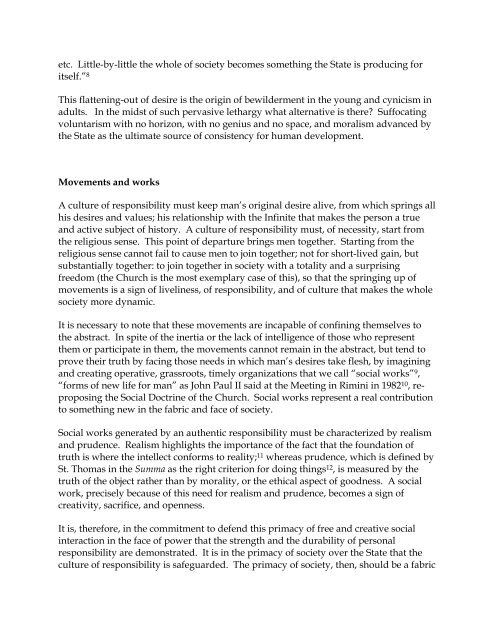The Religious Sense, Works, and Politics - Crossroads Cultural Center
The Religious Sense, Works, and Politics - Crossroads Cultural Center
The Religious Sense, Works, and Politics - Crossroads Cultural Center
You also want an ePaper? Increase the reach of your titles
YUMPU automatically turns print PDFs into web optimized ePapers that Google loves.
etc. Little-by-little the whole of society becomes something the State is producing foritself.” 8This flattening-out of desire is the origin of bewilderment in the young <strong>and</strong> cynicism inadults. In the midst of such pervasive lethargy what alternative is there? Suffocatingvoluntarism with no horizon, with no genius <strong>and</strong> no space, <strong>and</strong> moralism advanced bythe State as the ultimate source of consistency for human development.Movements <strong>and</strong> worksA culture of responsibility must keep man’s original desire alive, from which springs allhis desires <strong>and</strong> values; his relationship with the Infinite that makes the person a true<strong>and</strong> active subject of history. A culture of responsibility must, of necessity, start fromthe religious sense. This point of departure brings men together. Starting from thereligious sense cannot fail to cause men to join together; not for short-lived gain, butsubstantially together: to join together in society with a totality <strong>and</strong> a surprisingfreedom (the Church is the most exemplary case of this), so that the springing up ofmovements is a sign of liveliness, of responsibility, <strong>and</strong> of culture that makes the wholesociety more dynamic.It is necessary to note that these movements are incapable of confining themselves tothe abstract. In spite of the inertia or the lack of intelligence of those who representthem or participate in them, the movements cannot remain in the abstract, but tend toprove their truth by facing those needs in which man’s desires take flesh, by imagining<strong>and</strong> creating operative, grassroots, timely organizations that we call “social works” 9 ,“forms of new life for man” as John Paul II said at the Meeting in Rimini in 1982 10 , reproposingthe Social Doctrine of the Church. Social works represent a real contributionto something new in the fabric <strong>and</strong> face of society.Social works generated by an authentic responsibility must be characterized by realism<strong>and</strong> prudence. Realism highlights the importance of the fact that the foundation oftruth is where the intellect conforms to reality; 11 whereas prudence, which is defined bySt. Thomas in the Summa as the right criterion for doing things 12 , is measured by thetruth of the object rather than by morality, or the ethical aspect of goodness. A socialwork, precisely because of this need for realism <strong>and</strong> prudence, becomes a sign ofcreativity, sacrifice, <strong>and</strong> openness.It is, therefore, in the commitment to defend this primacy of free <strong>and</strong> creative socialinteraction in the face of power that the strength <strong>and</strong> the durability of personalresponsibility are demonstrated. It is in the primacy of society over the State that theculture of responsibility is safeguarded. <strong>The</strong> primacy of society, then, should be a fabric



